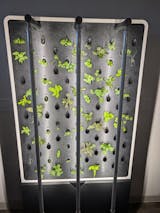Hydroponics 101
Let's start at the top...
Hydroponics 101
Ok, so what is hydroponics?
If you remember grade 10 biology, you probably remember your crazy, eccentric teacher explaining to you that plants need soil to get their nutrients. Well, that isn’t completely true.
Hydroponics is growing plants without soil in an inert medium. Different mediums can include coco coir, peat moss, and rocks (among many other materials). For your reference, we use peat moss plugs.
In Hydroponics, the nutrients are provided by carefully diluting nutrients into a water solution that is then used to water the plants you're growing hydroponically. Easy pea-sy.
What is urban agriculture?
Put simply, it’s about being able to produce food within the limits of urban areas like dense cities or suburbs. Urban farming is an alternative way of growing that differs from traditional agricultural practices by utilizing vast areas with inadequate farmland.
What is indoor growing?
Traditional outdoor farming is reliant on the seasons and weather. Traditional outdoor agriculture also has lower crop yields in comparison to industrial vertical farms. It also is an inefficient use of space.
New methods of farming indoors, and in particular vertical indoor farming, helps alleviate the issues mentioned above. Most importantly, it utilizes an enormous amount of otherwise unproductive space in ever dense cities and urban areas.
How nutritious is it growing without soil?
In terms of nutrition, nothing is more nutritious than freshly picked produce, whether it be soil grown, hydroponically grown, or grown through any other method (ie. aeroponics).
Growing and buying local (whether that's in your kitchen with an AEVA or EVE, in your garden, or at your local farmers market) is going to be the most nutritious food you can get. .
Facts
Why should you give a shishito pepper? 🌶
![]() Save 95% of water compared to traditional agriculture to grow your food
Save 95% of water compared to traditional agriculture to grow your food
![]() Eliminate carbon emissions required to transport food. Every. Single. One.
Eliminate carbon emissions required to transport food. Every. Single. One.
![]() Eliminate food waste by picking straight from your unit
Eliminate food waste by picking straight from your unit
![]() Eat nutrient-rich food every day
Eat nutrient-rich food every day
![]() Grow without pesticides
Grow without pesticides
![]() Utilize limited urban space for growing food
Utilize limited urban space for growing food
Want to learn more? See our gardens below or browse many of our amazing resources on our blog page, as seen below.

